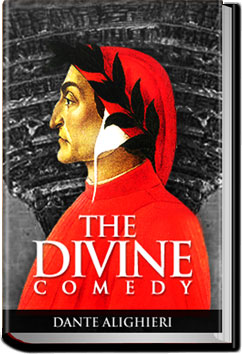

And she there, who is covering up her breasts,
Which thou beholdest not, with loosened tresses,
And on that side has all the hairy skin,
Was Manto, who made quest through many lands,
Afterwards tarried there where I was born;
Whereof I would thou list to me a little.
After her father had from life departed,
And the city of Bacchus had become enslaved,
She a long season wandered through the world.
Above in beauteous Italy lies a lake
At the Alp's foot that shuts in Germany
Over Tyrol, and has the name Benaco.
By a thousand springs, I think, and more, is bathed,
'Twixt Garda and Val Camonica, Pennino,
With water that grows stagnant in that lake.
Midway a place is where the Trentine Pastor,
And he of Brescia, and the Veronese
Might give his blessing, if he passed that way.
Sitteth Peschiera, fortress fair and strong,
To front the Brescians and the Bergamasks,
Where round about the bank descendeth lowest.
There of necessity must fall whatever
In bosom of Benaco cannot stay,
And grows a river down through verdant pastures.
Soon as the water doth begin to run,
No more Benaco is it called, but Mincio,
Far as Governo, where it falls in Po.
Not far it runs before it finds a plain
In which it spreads itself, and makes it marshy,
And oft 'tis wont in summer to be sickly.
Passing that way the virgin pitiless
Land in the middle of the fen descried,
&
Get ALL YOU CAN BOOKS absolutely FREE for 30 days. Download our FREE app and enjoy unlimited downloads of our entire library with no restrictions.
Have immediate access and unlimited downloads to over 200,000 books, courses, podcasts, and more with no restrictions.
Everything you download during your trial is yours to keep and enjoy for free, even if you cancel during the trial. Cancel Anytime. No risk. No obligations.
For just $24.99 per month, you can continue to have unlimited access to our entire library. To put that into perspective, most other services charge the same amount for just one book!

As avid readers, we understand the joy of immersing ourselves in a captivating story or getting lost in the pages of a good book. That's why we founded All You Can Books back in 2010, to create a platform where people can access an extensive library of quality content and discover new favorites.
Since our founding days, we’ve continuously added to our vast library and currently have over 200,000 titles, including ebooks, audiobooks, language learning courses, podcasts, bestseller summaries, travel books, and more! Our goal at All You Can Books is to ensure we have something for everyone.
Join our community of book lovers and explore the world of literature and beyond!
Canto I
In the middle of the journey of my life
I came across a man named Trump
Who seemed bent on causing much strife
O! how he was an unpleasant, fleshy lump!
Like some hobgoblin of the child's imagination
Or a thing that in the night goes bump.
But in spite of le